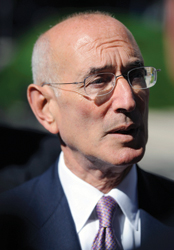Is the NFL collective-bargaining agreement illegal?
That’s the argument that counsel for a class of retirees led by hall of famer Carl Eller advanced in a Minnesota federal courtroom earlier this month. The NFL Players Association was not a union when it negotiated the terms of the new labor deal, Eller’s counsel argued, and labor law precludes non-unions from collectively bargaining. That is important because Eller contends the active NFL players negotiated insufficient benefits for the retirees, so they are seeking damages and potentially a renegotiation of the retirees’ elements of the CBA.
 |
NFLPA counsel Jeffrey Kessler called the retirees’ case “an attack on the process.”
Photo by: GORT PRODUCTIONS
|
The labor deal, argued Eller counsel Michael Hausfeld, was “reached by a non-union in an unlawful collective bargaining,” according to a transcript of the hearing.
“If in the context of an overall need to keep football going labor law can be disregarded, individual rights can be disregarded, and class representation rights can be disregarded, fiduciary obligations get overlooked, I think the retirees tragically might have to accept that,” Hausfeld told the court. “But that’s what happened.”
Judge Susan Nelson, who famously ruled to lift the lockout last April before her ruling was overturned on appeal, seriously questioned Hausfeld’s logic, saying that even if technically what he said were true, the retirees could not prove damages. The retirees received $900 million as part of the CBA, but Hausfeld said the NFL had been willing to give $1.5 billion before the active players took some of that for themselves.
 |
Nelson
|
Nelson called the Feb. 15 hearing to listen to arguments on the NFLPA’s motion to dismiss the case — a motion on which she is expected to rule soon and, given her comments, appears willing to grant. The Eller class would almost certainly appeal.
The NFLPA decertified in March 2011 so players could file an antitrust lawsuit against the NFL because unions are precluded from taking such actions. Under the guidance of a federal mediator, representatives of the NFLPA (operating as a trade association) and the players engaged in talks with the NFL, which had locked out the players. Those talks ultimately led to a 10-year CBA, the first season of which was just completed.
The NFLPA response is that it did not break labor law because what emerged from mediation was a settlement to the antitrust lawsuit (Brady v. NFL), and only after the group reformed as a union did it agree to a CBA. The players and NFL on July 26 announced a settlement of the lawsuit, but saying the settlement was contingent on the new CBA being ratified. The NFLPA recertified a few days later, and a few days after that, the two sides announced the new CBA.
 |
Hausfeld
|
Hausfeld contends this timeline masks what really happened: a CBA in essence getting done in tandem with the settlement. In fact, he said, a copy of the settlement he received included a copy of the CBA as an exhibit. Because only unions can agree to a CBA, Hausfeld contends this constitutes a major labor law violation.
Eller and his group, worried about lost benefits during the lockout, had filed their own claim against the NFL after the labor impasse began and sporadically participated in mediation. It is their contention that the active players sidelined them from the talks and then took from what the NFL had been ready to give the retirees. Eller dropped his claim against the NFL after the settlement and filed against the NFLPA in September. The case is Eller v. NFLPA.
The NFLPA counsel, Jeffrey Kessler, blasted the retirees in court for seeking to overturn the results of court-ordered mediation. He told Nelson that the mediator, whom she assigned, had the parties agree not to bring lawsuits based on the process. “The reason why the Court’s order precludes an attack on the mediation process is their claims are an attack on the process itself,” he said. “It was determined by Judge [Arthur] Boylan [the mediator] who set the agendas in the process and everyone agreed the process couldn’t be used against anyone for any purpose and the Court so ordered. So it’s an attack on the process.”
Experts said it was highly unlikely the retirees could win. “Nothing the union agreed to in the settlement agreement and then the CBA were legally binding on the retired players or barred them from trying to get more from the NFL,” said Gary Roberts, a former NFL outside counsel. “The retired players even had their own separate lawsuit and separate counsel representing them, and they voluntarily agreed to dismiss their lawsuit against the NFL.”
Indeed, several times Kessler and Nelson asked why the retirees were not suing the NFL. Hausfeld replied it was still an option, but added that it was the NFLPA that interfered with the retirees, not the league, which he described as wanting to work with Eller before mediation.
In a later interview, Hausfeld said he did not see how the courts could overlook the fact the NFLPA engaged in what he deems illegal collective bargaining.
“I don’t think anyone is properly assessing our will to take this as far and as long as necessary,” he said. “If it was illegal,” he added rather ominously, “the full CBA has to be thrown out and renegotiated.”






